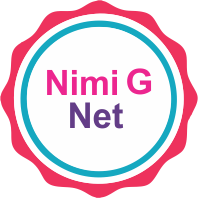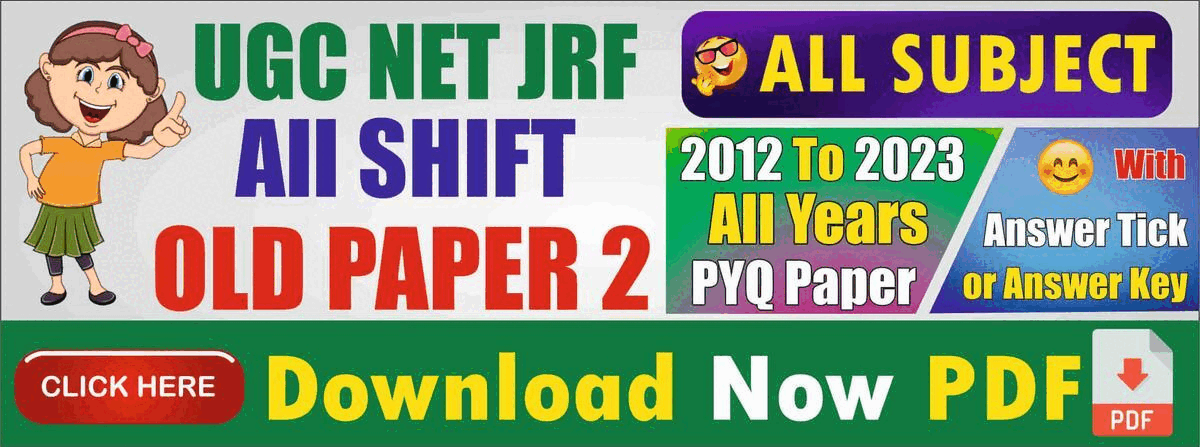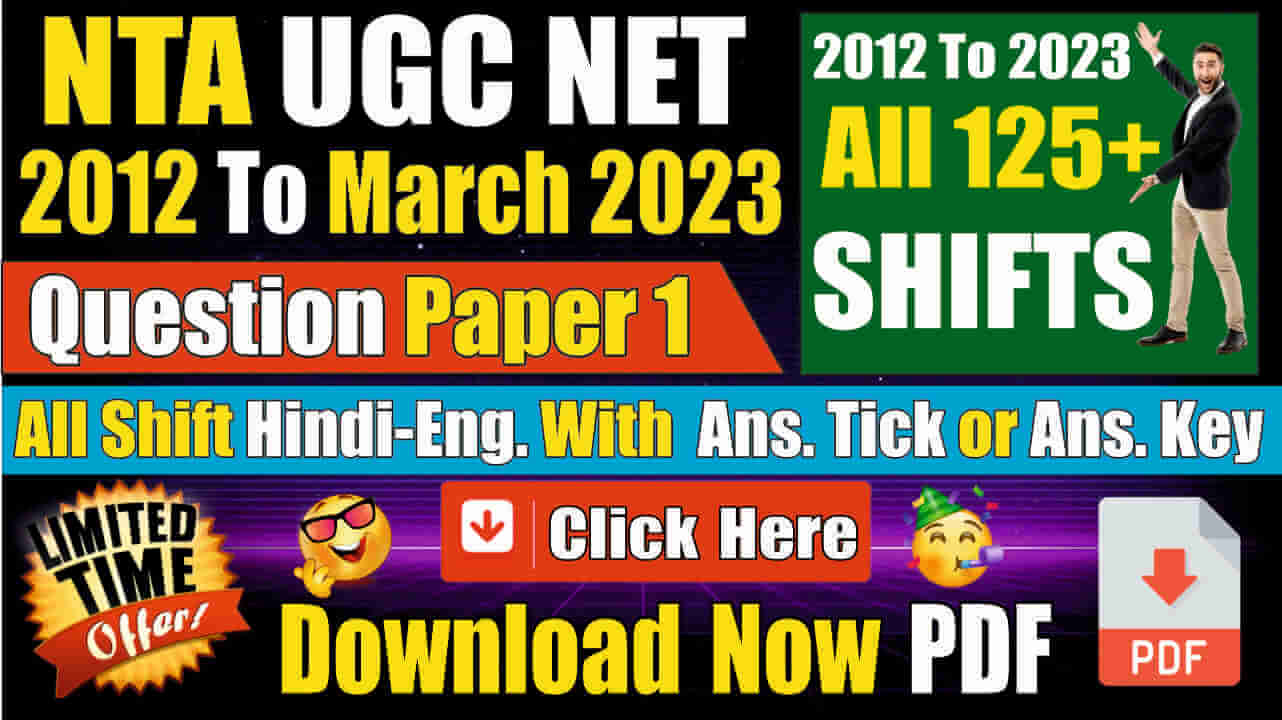Are you searching for the UGC NET Commerce Syllabus 2023 PDF Download? Look no further, as we have compiled all the important details and tips to help you prepare for the exam.
The UGC NET Commerce exam is conducted by the National Testing Agency (NTA) for candidates who wish to pursue a career in the field of Commerce. The exam assesses the candidates’ knowledge in the subject and tests their eligibility for lectureship and research fellowships.
If you are planning to appear for the UGC NET Commerce 2023 exam, it is important to have a thorough understanding of the syllabus and exam pattern. In this article, we have compiled all the important information you need to know about the UGC NET Commerce Syllabus 2023 PDF Download
UGC NET Commerce Exam Pattern 2023:
The UGC NET Commerce exam consists of two papers – Paper 1 and Paper 2. Both papers are conducted on the same day, and the duration of each paper is 3 hours. The exam is conducted online, and each question carries 2 marks. There is no negative marking for incorrect answers.
The UGC NET Commerce Exam consists of two papers: Paper 1 and Paper 2.
Paper 1:
- Duration: 3 hours
- Number of questions: 50
- Total marks: 100
- Type of questions: Multiple Choice Questions (MCQs) based on general aptitude, teaching and research aptitude, and current affairs.
Paper 2:
- Duration: 3 hours
- Number of questions: 100
- Total marks: 200
- Type of questions: MCQs based on Commerce subjects.
Both papers are conducted in a single session with no break in between. The candidates are required to appear for both papers to be considered for the selection process.
It’s important to note that there is no negative marking for incorrect answers in UGC NET Commerce Exam.
UGC NET Commerce Syllabus 2023: Download PDF
The UGC NET Commerce syllabus is divided into two parts – Paper 1 and Paper 2. Here’s a detailed syllabus for both papers.
Paper 1 Syllabus:
Teaching Aptitude:
- Teaching: Nature, objectives, characteristics, and basic requirements.
- Learner’s characteristics: Characteristics of adolescent and adult learners, and individual differences.
- Methods of teaching: Teacher-centered vs. learner-centered methods; Off-line vs. online methods.
- Evaluation systems: Elements and types of evaluation, evaluation in higher education, and grading system.
Research Aptitude:
- Research: Meaning, types, and characteristics.
- Steps of research.
- Methods of research.
- Research Ethics.
Reading Comprehension:
- Comprehension passages.
Communication:
- Communication: Nature, characteristics, types, barriers, and effective communication.
- Verbal and non-verbal communication.
- Classroom communication.
Logical Reasoning:
- Understanding the structure of arguments.
- Evaluating and distinguishing deductive and inductive reasoning.
- Verbal analogies.
Data Interpretation:
- Sources, acquisition, and interpretation of data.
- Quantitative and qualitative data.
- Graphical representation and mapping of data.
Paper 2 Syllabus:
Nta Ugc Net Commerce Syllabus 2023 in English
Here you can check the latest UGC NET Syllabus For Commerce Paper-II 2021 for English Medium.
Unit 1: Business Environment and International Business
- Concepts and elements of business environment: Economic environment- Economic systems, Economic policies(Monetary and fiscal policies); Political environment- Role of government in business; Legal environment- Consumer Protection Act, FEMA; Socio-cultural factors and their influence on business; Corporate Social Responsibility (CSR)
- Scope and importance of international business; Globalization and its drivers; Modes of entry into international business
- Theories of international trade; Government intervention in international trade; Tariff and non-tariff barriers; India’s foreign trade policy
- Foreign direct investment (FDI) and Foreign portfolio investment (FPI); Types of FDI, Costs and benefits of FDI to home and host countries; Trends in FDI; India’s FDI policy
- Balance of payments (BOP): Importance and components of BOP
- Regional Economic Integration: Levels of Regional Economic Integration; Trade creation and diversion effects; Regional Trade Agreements: European Union (EU), ASEAN, SAARC, NAFTA
- International Economic Institutions: IMF, World Bank, UNCTAD
- World Trade Organisation (WTO): Functions and objectives of WTO; Agriculture Agreement; GATS; TRIPS; TRIMS
Unit 2: Accounting and Auditing
- Basic accounting principles; concepts and postulates
- Partnership Accounts: Admission, Retirement, Death, Dissolution and Insolvency of partnership firms
- Corporate Accounting: Issue, forfeiture and reissue of shares; Liquidation of companies; Acquisition, merger, amalgamation and reconstruction of companies
- Holding company accounts
- Cost and Management Accounting: Marginal costing and Break-even analysis; Standard costing; Budgetary control; Process costing; Activity Based Costing (ABC); Costing for decision-making; Life cycle costing, Target costing, Kaizen costing and JIT
- Financial Statements Analysis: Ratio analysis; Funds flow Analysis; Cash flow analysis
- Human Resources Accounting; Inflation Accounting; Environmental Accounting
- Indian Accounting Standards and IFRS
- Auditing: Independent financial audit; Vouching; Verification ad valuation of assets and liabilities; Audit of financial statements and audit report; Cost audit
- Recent Trends in Auditing: Management audit; Energy audit; Environment audit; Systems audit; Safety audit
Unit 3: Business Economics
- Meaning and scope of business economics
- Objectives of business firms
- Demand analysis: Law of demand; Elasticity of demand and its measurement; Relationship between AR and MR
- Consumer behavior: Utility analysis; Indifference curve analysis
- Law of Variable Proportions: Law of Returns to Scale
- Theory of cost: Short-run and long-run cost curves
- Price determination under different market forms: Perfect competition; Monopolistic competition; Oligopoly- Price leadership model; Monopoly; Price discrimination
- Pricing strategies: Price skimming; Price penetration; Peak load pricing
Unit 4: Business Finance
- Scope and sources of finance; Lease financing
- Cost of capital and time value of money
- Capital structure
- Capital budgeting decisions: Conventional and scientific techniques of capital budgeting analysis
- Working capital management; Dividend decision: Theories and policies
- Risk and return analysis; Asset securitization
- International monetary system
- Foreign exchange market; Exchange rate risk and hedging techniques
- International financial markets and instruments: Euro currency; GDRs; ADRs
- International arbitrage; Multinational capital budgeting
Unit 5: Business Statistics and Research Methods
- Measures of central tendency
- Measures of dispersion
- Measures of skewness
- Correlation and regression of two variables
- Probability: Approaches to probability; Bayes’ theorem
- Probability distributions: Binomial, poisson and normal distributions
- Research: Concept and types; Research designs
- Data: Collection and classification of data
- Sampling and estimation: Concepts; Methods of sampling – probability and non-probability methods; Sampling distribution; Central limit theorem; Standard error; Statistical estimation
- Hypothesis testing: z-test; t-test; ANOVA; Chi–square test; Mann-Whitney test (U-test); Kruskal-Wallis test (H-test); Rank correlation test
- Report writing
Unit 6: Business Management and Human Resource Management
- Principles and functions of management
- Organization structure: Formal and informal organizations; Span of control
- Responsibility and authority: Delegation of authority and decentralization
- Motivation and leadership: Concept and theories
- Corporate governance and business ethics
- Human resource management: Concept, role and functions of HRM; Human resource planning; Recruitment and selection; Training and development; Succession planning
- Compensation management: Job evaluation; Incentives and fringe benefits
- Performance appraisal including 360-degree performance appraisal
- Collective bargaining and workers’ participation in management
- Personality: Perception; Attitudes; Emotions; Group dynamics; Power and politics; Conflict and negotiation; Stress management
- Organizational Culture: Organizational development and organizational change
Unit 7: Banking and Financial Institutions
- Overview of Indian financial system
- Types of banks: Commercial banks; Regional Rural Banks (RRBs); Foreign banks; Cooperative banks
- Reserve Bank of India: Functions; Role and monetary policy management
- Banking sector reforms in India: Basel norms; Risk management; NPA management
- Financial markets: Money market; Capital market; Government securities market
- Financial Institutions: Development Finance Institutions (DFIs); Non-Banking Financial Companies (NBFCs); Mutual Funds; Pension Funds
- Financial Regulators in India
- Financial sector reforms including financial inclusion
- Digitisation of banking and other financial services: Internet banking; mobile banking; Digital payments systems
- Insurance: Types of insurance- Life and Non-life insurance; Risk classification and management; Factors limiting the insurability of risk; Re-insurance; Regulatory framework of insurance- IRDA and its role
Unit 8: Marketing Management
- Marketing: Concept and approaches; Marketing channels; Marketing mix; Strategic marketing planning; Market segmentation, targeting and positioning
- Product decisions: Concept; Product line; Product mix decisions; Product life cycle; New product development
- Pricing decisions: Factors affecting price determination; Pricing policies and strategies
- Promotion decisions: Role of promotion in marketing; Promotion methods – Advertising; Personal selling; Publicity; Sales promotion tools and techniques; Promotion mix
- Distribution decisions: Channels of distribution; Channel management
- Consumer Behaviour; Consumer buying process; factors influencing consumer buying decisions
- Service marketing
- Trends in marketing: Social marketing; Online marketing; Green marketing; Direct marketing; Rural marketing; CRM
- Logistics management
Unit 9: Legal Aspects of Business
- Indian Contract Act, 1872: Elements of a valid contract; Capacity of parties; Free consent; Discharge of a contract; Breach of contract and remedies against breach; Quasi contracts;
- Special contracts: Contracts of indemnity and guarantee; contracts of bailment and pledge; Contracts of agency
- Sale of Goods Act, 1930: Sale and agreement to sell; Doctrine of Caveat Emptor; Rights of unpaid seller and rights of buyer
- Negotiable Instruments Act, 1881: Types of negotiable instruments; Negotiation and assignment; Dishonour and discharge of negotiable instruments
- The Companies Act, 2013: Nature and kinds of companies; Company formation; Management, meetings and winding up of a joint-stock company
- Limited Liability Partnership: Structure and procedure of formation of LLP in India
- The Competition Act, 2002: Objectives and main provisions
- The Information Technology Act, 2000: Objectives and main provisions; Cyber crimes and penalties
- The RTI Act, 2005: Objectives and main provisions
- Intellectual Property Rights (IPRs): Patents, trademarks, and copyrights; Emerging issues in intellectual property
- Goods and Services Tax (GST): Objectives and main provisions; Benefits of GST; Implementation mechanism; Working of dual GST
Unit 10: Income-tax and Corporate Tax Planning
- Income-tax: Basic concepts; Residential status and tax incidence; Exempted incomes; Agricultural income; Computation of taxable income under various heads; Deductions from Gross total income; Assessment of Individuals; Clubbing of incomes
- International Taxation: Double taxation and its avoidance mechanism; Transfer pricing
- Corporate Tax Planning: Concepts and significance of corporate tax planning; Tax avoidance versus tax evasion; Techniques of corporate tax planning; Tax considerations in specific business situations: Make or buy decisions; Own or lease an asset; Retain; Renewal or replacement of asset; Shut down or continue operations
- Deduction and collection of tax at source; Advance payment of tax; E-filing of income tax returns
Paper 2 Syllabus Download Pdf:
Ugc Net Commerce Syllabus 2023 in English
Ugc Net Commerce Syllabus 2023 in Hindi
Preparation Tips for UGC NET Commerce Exam 2023:
Here are some tips for preparing for the UGC NET Commerce exam 2023:
- Understand the syllabus and exam pattern thoroughly.
- Make a study plan
- Refer to standard textbooks and study materials recommended for the exam.
- Practice previous year question papers and mock tests.
- Focus on time management and accuracy while attempting the questions.
- Take regular breaks and maintain a healthy lifestyle to avoid burnout.
- Join coaching classes or online courses if necessary.
- Stay updated with current affairs related to the Commerce field.
Important Points:
- The UGC NET Commerce exam is conducted by NTA for candidates who wish to pursue a career in Commerce.
- The exam assesses the candidates’ knowledge in the subject and tests their eligibility for lectureship and research fellowships.
- The exam pattern of UGC NET Commerce 2023 includes multiple-choice questions and is conducted in online mode.
- The marking scheme of the exam is +2 for a correct answer and no negative marking for incorrect answers.
- The duration of the exam is 3 hours, and the number of questions is 150.
- The UGC NET Commerce Syllabus 2023 PDF Download is an important document that provides a detailed outline of the topics that will be covered in the exam.
- To download the syllabus, candidates can visit the official website of NTA and click on the link provided.
- The syllabus is available in PDF format and can be downloaded for free.
- The syllabus is divided into nine units, each covering a specific topic related to Commerce.
- To prepare for the exam, candidates must understand the syllabus, make a study plan, practice previous year question papers, join a coaching institute, take mock tests, and revise regularly.
FAQs:
- Is there any negative marking in the UGC NET Commerce exam 2023? Ans: No, there is no negative marking for incorrect answers.
- Can I download the UGC NET Commerce Syllabus 2023 PDF from the official website? Ans: Yes, the syllabus is available for download on the official website of NTA.
- What is the duration of the UGC NET Commerce exam 2023? Ans: The duration of each paper is 3 hours.
Also Check:
Conclusion:
In conclusion, the UGC NET Commerce exam 2023 is a crucial opportunity for aspirants who want to pursue a career in the teaching or research field. To crack the exam, it’s essential to have a clear understanding of the syllabus, exam pattern, and prepare accordingly. With a comprehensive understanding of the UGC NET Commerce Syllabus 2023 PDF download and proper preparation, you can clear the exam with flying colors.






1 thought on “[New] UGC NET Commerce Syllabus 2023 PDF Download”